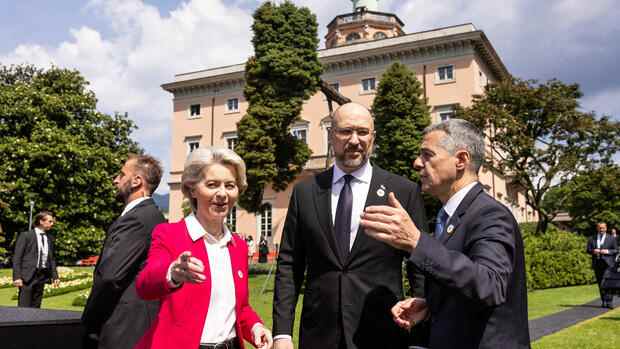Lugano, Brussels It was an urgent appeal that Volodymyr Zelensky made to his potential donors: Russia has destroyed educational institutions in the four months since the invasion in 2000, the Ukrainian president said. “They aim artillery at kindergartens.” Hundreds of medical facilities were destroyed. “How can they order airstrikes on hospitals and maternity wards?” Zelensky lamented. Rebuilding his country, he stressed, will require “enormous investments”.
Selenski spoke via video link in Lugano on Monday. At the invitation of Swiss Federal President Ignazio Cassis, delegations from around 40 countries are discussing the reconstruction of a country destroyed by Russia’s war of aggression. Cassis assured Selenski of Switzerland’s support.
The country stands with Ukraine. The aim of the conference is to create “a framework for long-term reconstruction”. The guidelines for reconstruction are to be agreed in the Lugano Principles, which are to be formally decided on Tuesday.
EU Commission President Ursula von der Leyen said: “Ukraine will emerge from this war as a stronger, more modern country.” Europe will therefore help Kyiv, it is “our moral duty”.
Top jobs of the day
Find the best jobs now and
be notified by email.
The European Investment Bank (EIB) is providing the initial impetus for reconstruction: on Monday it proposed setting up a EUR 100 billion reconstruction fund for Ukraine. Initially, national governments and the EU Commission are to provide 20 billion euros in the form of donations, loans and guarantees. According to the plans, the guarantees are intended to mobilize up to 80 billion euros in private capital for infrastructure projects.
The Russian war of aggression has already caused billions in damage.
(Photo: IMAGO/Ukrinform)
According to the EIB, this fund could be operational within weeks. The bank is ready to help with its financial and technical expertise, said EIB Vice-President Teresa Czerwinska. However, it is unclear what financial commitments the EU member states would be willing to make. The EU Commission has recently had problems getting the necessary funds for a loan of nine billion euros for Ukraine.
The EIB’s fund could become part of a joint platform “Rebuild Ukraine” recently proposed by the Commission. The platform is intended as a central tool to collect funds for Ukraine and decide on their use. It is said to be under the joint management of the Commission and the Ukrainian government in order to prevent the funds from falling victim to corruption.
Studies put the cost of rebuilding Ukraine at up to $1 trillion. However, the economist Maria Demertzis from the Bruegel think tank thinks these estimates are too high. A rough rule of thumb is that a country’s assets are three times its economic output, she explains. In the case of Ukraine, gross domestic product is $200 billion, so total wealth would be $600 billion. The war didn’t destroy the entire country, so some estimates of the damage seemed exaggerated, says Demertzis.
Peace in Ukraine is still a long way off, the country recently had to cope with military setbacks. At the beginning of the week, the Russian army announced that it had taken the Luhansk region. The Ukrainian army confirmed their withdrawal. However, President Cassis said: “It is never too early to start planning.”
Economist Demertzis also thinks it is right to create the institutions for reconstruction now. This is also important as a political signal to Ukraine, she says. However, it dampens expectations of how quickly money will actually flow. “As long as the war goes on, EU governments will not provide any money for reconstruction,” she says. Humanitarian and military purposes now have priority. Private companies would also wait until there was a ceasefire before investing in the country.
Corona fund as a model for Ukraine aid?
Ukraine’s financial needs are already high: the EU Commission estimates that the Ukrainian government’s tax revenues could fall by up to 80 percent this year. According to the International Monetary Fund, the government therefore needs five billion euros in support from abroad every month to cover current expenses.
The EIB has provided EUR 4.7 billion in Ukraine aid and loans since the Russian invasion. In March it transferred 668 million euros in emergency aid so that the Ukrainian government could cover its current expenses. In addition, it has set up a credit line of four billion euros for EU municipalities that have taken in refugees from Ukraine. These loans only have to be applied for. The first funds have already flowed to Poland.
The EIB management wants to provide a further 1.5 billion euros to repair or rebuild hospitals and waterworks destroyed in the war. This money has yet to be approved by the EU member states that make up the governing board. But this money only helps in the short term.
In view of the enormous long-term financial requirements, there is a debate in Brussels about whether joint debt should be taken out again – as with the 750 billion euro Corona reconstruction fund. However, the Federal Government has so far categorically rejected this proposal. Finance Minister Christian Lindner emphasizes that the Corona reconstruction fund is a one-off exception.
Demertzis also believes that the Brussels speculation about financing the reconstruction with joint EU debt is unrealistic. The Corona Fund was “a true miracle,” she says. However, the pandemic state of emergency cannot be compared with the situation in Ukraine. “The EU should first define a common foreign policy with clear goals before talking about joint financing,” she said.
More: Why Ukraine’s finances could be in dangerous trouble

